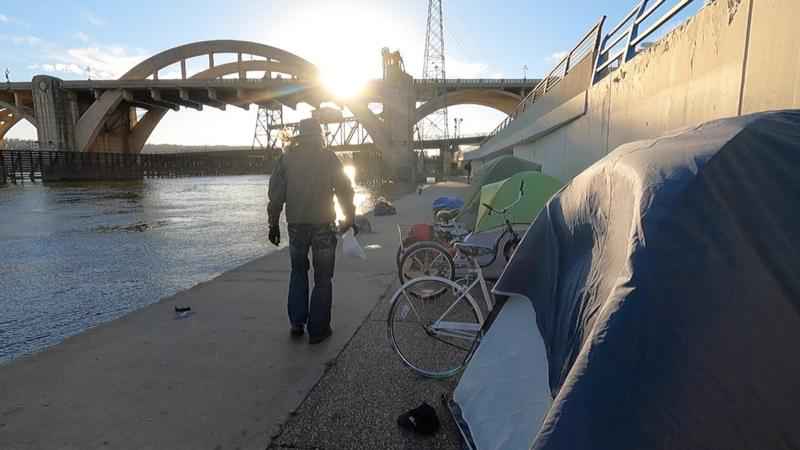Local man on a mission to help those experiencing homelessness
[anvplayer video=”5073682″ station=”998122″]
Even on a clear blue day, Todd Feske keeps his eyes on the sky.
“We’ve been blessed, Saturday was gorgeous,” he smiles. “We’ve got decent weather, they’re more apt to come up and get stuff too."
Feske is with the homeless advocacy group "Walking With A Purpose Minnesota.”
“They” are the people he cares for — people who are living outside.
“I’m going to go back,” Feske tells one woman, after chatting with her in one encampment. “You’re good now? All right, you be safe, love you,” he adds.

Todd Feske walking along St. Paul’s Lower Landing Park.[Mike Soe/KSTP]
In St. Paul’s Lower Landing Park, some live in tents. Others have no shelter at all.
5 EYEWITNESS NEWS asked Feske what his biggest worry was regarding those living in the park.
“That they survive the winter,” he responds. “What we do, we actually walk into the camps to help the people. We specialize with the unsheltered community. We hike into the camps and find ’em.”
The latest numbers from the St. Paul Department of Safety and Inspections show there are 33 unsheltered residents living in 17 encampments, in outdoor locations, or under bridges.
But the department says those numbers don’t represent every person experiencing homelessness in the city.
Feske says he’s seeing an uptick in the number of people living in encampments — and that his team found over 75 people just last week.
“We were able to get a lot of them last winter because we had the COVID dollars, and so they put them in hotels and other places,” he says. “And of course, that ends, and so people are starting to come back out.”
Ramsey County officials say they now have 134 shelter rooms at Mary Hall, 70 at Stub Hall at Luther Seminary and 100 rooms at the Bethesda Hospital.
A spokesperson says those leased temporary shelter rooms are "essentially at capacity."
The county says there are an additional 212 shelter beds provided by private and faith-based groups.
Catholic Charities and the Union Gospel House are among the organizations providing shelter spaces.
Feske says even if shelter beds are available, some people don’t want to use them.
“We also have people that just don’t fit into that [housing] system — that never went in and they’ve been out constantly,” he notes.
Homelessness is a statewide problem
The U.S. Department of Housing and Urban Development says as of January 2020, nearly 8000 people experienced homelessness on any given day in Minnesota.
That data was collected just before COVID-19 was declared a national emergency.
According to Feeding America, more than 430,000 Minnesotans struggled with food insecurity in 2019 — which means they don’t have reliable access to enough affordable, nutritious food.
Feske says he’s trying to do his part, connecting with up to 400 people over the last seven years and supplying them with 5,000 meals.
With the winter temperatures sometimes dipping well below zero, he says this is all about survival and preparation.
“Let me get you a bag with some food,” he tells one person in the encampment.
“Who’s in there?” Feske calls into a tent.
“Do you have a blanket?” asks a voice from inside.
“Yeah, we got all that stuff,” Feske responds and offers food, too.
“We try to do what we can for them. Right now we’re going through a lot of hand warmers,” he explains. “We have a very, very strong group of volunteers to come out. They’re feeding them turkey dinners and hot chocolate, too.”
Feske, who’s 66, also drives a small bus from encampment to encampment.
Like a Walmart with wheels, it’s packed with donated items.
"We cover everything from their clothes, shoes, camping gear, first aid, candles batteries, pretty much everything you need to survive outside,” Feske says.
We found Cyretha Bounds on the bus, getting a new pair of shoes.
"Everybody should be grateful because I know I am,” she says. “I think he’s doing excellent. I just told him, he gives good blessings. Nice sweet guy."
Bounds says she’s lived on the street or in a shelter for the past three years.
For her and others at the encampment, dealing with the weather is a hard, bitter truth.
“I’m going to be inside,” Bounds said about coping with the cold. “If I do have a tent, hopefully, I won’t be inside by myself. I don’t do winters by myself.”
Among those volunteering with Feske is David Doren.
"Yeah, I was living in a tent on the river,” he recalls.
Just three years ago, Doren lived in Lower Landing Park, before the homelessness advocacy group "Settled" rescued him from the cold.
Now, he’s paying it forward.
"When I met them, it was 40-45 degrees below zero, and they came and put me in a hotel and they’ve been helping me ever since,” Doren says. “I know what’s it’s like, so it’s a lot easier for me to help them out."
On this day to give thanks, Feske and his team are giving back, one person at a time.
Helping with hope — and much more.
"These people have a hard life,” he explains. “The main thing we do is interact with them and that’s important, so they have someone to tell their stories to, someone to listen to them. We do what we can. We just try to make it one week to the next is our kind of philosophy.”